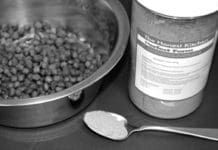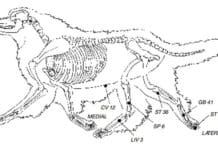Gluten-Free Dog Diets
Does your dog suffer from allergies, joint pain, epilepsy, recurrent ear infections, or other chronic health problems? Have you tried lots of treatments alternative and conventional but you just can't seem to help your dog get well and stay that way? You might want to look a little closer at the diet recommendations of John Symes, DVM.
Does Your Dog Have Gas?
It is normal for dogs to have an occasional bout of gas. But it is not normal for flatulence to occur all the time. Flatulence can be relieved quickly in dogs by use of simethicone, the same anti-foaming drug that is marketed for humans in a variety of over-the-counter preparations. Simethicone is generally accepted as safe for dogs, even in human-sized doses. However, there may be some drawbacks to the use of Gaviscon, Gas-X, or any other simethicone product in your dog.
The Canine Digestion Process
Digestion involves the balanced interaction of several biodynamic systems. A healthy animal ingests raw materials (food), changes these raw materials into usable nutrients, extracts from these nutrients the essentials for life and vitality, and excretes (in the form of feces) those substances that have not been digested or that werent utilized.
Acupressure Improves Your Dog’s Digestion
If not for their dinner bowls, dogs would still be wolves. In many ways our devoted, domesticated dogs are still wolves, especially when it comes to their digestion. In the past 10 years, holistically oriented guardians and healthcare practitioners have become proponents of fresh food diets plus supplements for dogs. There are many authoritative books, journals, and magazines that are doing their best to raise the consciousness of the general public about the health issues associated with manufactured dog foods.
Herbal Remedies for Inflammatory Bowel Disease (IBD)
Conventional approaches to inflammatory bowel disease often involve a controlled diet of highly digestible foods that are rich in supplemental dietary fiber. Often, cortico-steroid drugs (such as Prednisone) and other immunosuppressive drugs are prescribed to rapidly reduce pain and inflammation. These drugs may bring fast, temporary relief from painful symptoms, but they can be risky, especially if employed long-term.
Colitis: An Urgent Problem
Conventional medical practitioners use the word colitis to indicate inflammation of the colon (the large intestine), as opposed to inflammation of the small intestine or the stomach. One of the large intestine’s most important roles is to absorb water. If the colon is not functioning properly, a lot of water is left in the stool; that’s diarrhea. There are many different types of diarrhea, and, unpleasant as it may be to contemplate, the characteristics of the diarrhea help us identify which part of the dog’s digestive system is not working properly.












